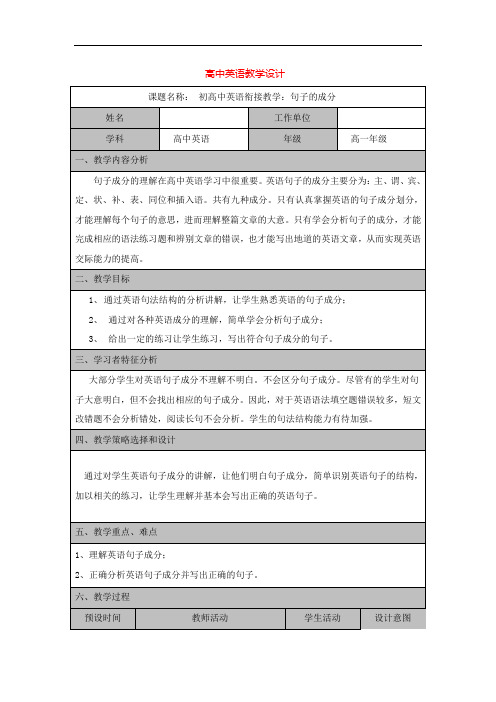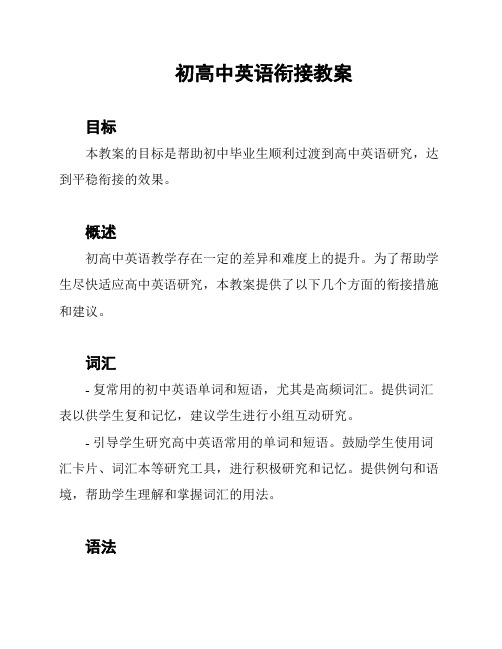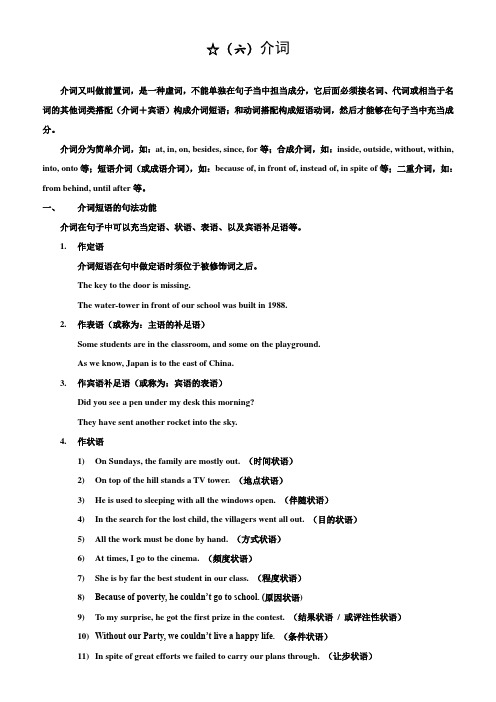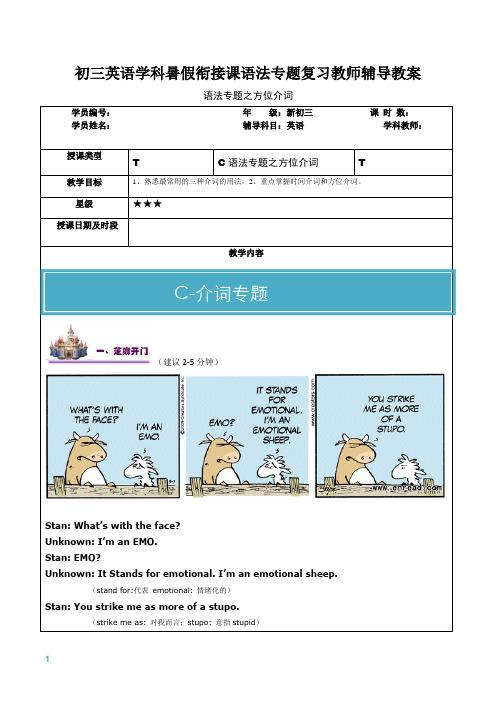初高中英语衔接教学案介词
初中介词连词教案

初中介词连词教案一、教学目标:1. 让学生掌握常用的介词和连词,包括时间、地点、方向、原因等。
2. 让学生能够正确使用介词和连词,使句子表达清晰、连贯。
3. 培养学生运用英语进行交际的能力。
二、教学内容:1. 介词:at, on, in, above, below, over, under, between, among, near, behind, in front of等。
2. 连词:and, but, or, because, so, if, when, before, after, until, while等。
三、教学步骤:1. 引入新课:通过一幅图片,让学生找出图片中的时间和地点信息,引导学生使用介词和连词来描述图片。
2. 讲解介词和连词:讲解常用介词和连词的用法,通过例句展示如何正确使用这些词语。
3. 练习:让学生进行填空练习,使用所学的介词和连词完成句子。
4. 小组活动:学生分组,进行角色扮演,使用所学的介词和连词来描述物体位置和动作顺序。
5. 总结:对本节课所学内容进行总结,强调介词和连词在句子中的重要性。
四、教学评价:1. 课堂参与度:观察学生在课堂上的积极参与情况,是否能够主动使用所学的介词和连词。
2. 练习完成情况:检查学生完成练习的情况,是否能够正确使用介词和连词。
3. 小组活动表现:评价学生在小组活动中的表现,是否能够有效地使用所学的介词和连词进行描述。
五、教学反思:本节课通过引入图片和进行小组活动,激发学生的学习兴趣,帮助他们理解和掌握常用的介词和连词。
在教学过程中,要注意引导学生正确使用这些词语,使句子表达清晰、连贯。
同时,要关注学生的个体差异,给予不同的学生不同的指导和帮助,确保他们能够有效地掌握所学的知识。
句子的成分教学设计-初高中英语衔接教学

2. 表示动作发生的时间,地点,目的,方式,程度,结果,条件,让步,伴随和情状等。
八、同位语(apposition)
1.对前面的名词或代词做进一步解释,说明它们一种句子成分。
九、插入语(parenthesis
(8) The young man looks healthy and handsome.
(9) We were sitting in front of our computers at that time.
(10) He seemed to have caught a cold.
Step 3 practice (20miutes)
Let students dosome exercises to learn the usage of the structure of English .
一、主语(subject)
1. 主语是句子陈述的对象。
2.一般在句首。
3. 一般由名词,代词或相当于名词的词或短语充当。
插入语指的是对一句话所做的附加解释。其作用是,补足句意,包括说话者的态度,或引起听话者的注意。以下句子带有常见的插入语:
Students must take an active part in all kinds of activities and give some active discussions .finally they should learn to do some exercises in person .
一、定义:
二、分类 1、主语(subject)
2、谓语(verb)
3、表语(predicative)
4、宾语(object)
初高中英语衔接教案

初高中英语衔接教案目标本教案的目标是帮助初中毕业生顺利过渡到高中英语研究,达到平稳衔接的效果。
概述初高中英语教学存在一定的差异和难度上的提升。
为了帮助学生尽快适应高中英语研究,本教案提供了以下几个方面的衔接措施和建议。
词汇- 复常用的初中英语单词和短语,尤其是高频词汇。
提供词汇表以供学生复和记忆,建议学生进行小组互动研究。
- 引导学生研究高中英语常用的单词和短语。
鼓励学生使用词汇卡片、词汇本等研究工具,进行积极研究和记忆。
提供例句和语境,帮助学生理解和掌握词汇的用法。
语法- 复初中英语的基本语法规则和句型结构。
重点讲解常见的语法错误和容易混淆的语法点,帮助学生纠正错误和提高语法准确性。
- 引导学生研究高中英语的语法知识。
结合课文和题,进行语法讲解和练,加深对语法规则的理解和掌握。
阅读理解- 练解读和理解不同类型的英语文本,如文章、小说、新闻报道等。
提供丰富的阅读材料,引导学生进行阅读理解训练,并提供相关题进行巩固练。
- 培养学生的阅读技巧和阅读速度。
引导学生通过快速阅读和摘要写作等活动,提高阅读效率和理解能力。
写作能力- 引导学生研究高中英语的常见写作形式和写作技巧。
通过示范和练,训练学生的写作能力和表达能力。
- 鼓励学生进行写作实践,如作文、日记、书评等。
提供写作指导和反馈,帮助学生完善写作技巧。
听力和口语- 培养学生的听力理解能力。
提供各种听力材料,如录音、对话、新闻等,引导学生进行听力训练,提高听力水平。
- 激发学生的口语表达能力。
通过角色扮演、小组讨论等活动,鼓励学生主动参与英语口语练,提高口语流利度和表达能力。
总结本教案提供了多方面的衔接措施和建议,旨在帮助初中毕业生顺利过渡到高中英语学习。
学生可根据自身情况,选择适合自己的学习方法和策略,积极参与学习,提高英语综合能力。
英语 初高中衔接---介词

Fill in the blanks:
at 1.They often have parties ______ Christmas. on 2.They plan to go to Hainan ______ vacation. On of 3.______the morning ______ March 31,she made an important decision in her life. During 4.______ the lifetime, Hepburn earned four more Oscar nominations. since 5.It has rained ______ the day before yesterday. 6.It was a very long day for Jack. He didn’t get until home from school ______ six o’clock.
3. for + 时段 since + 时段 + ago 常用于现在完成时 since + 时间点 since + 一般过去时句子 1.He came here __ 1992, and he has lived here ___ 1992. A. in, for B. in , since C. since, since 2.I have known Li Lei __ over five years. A. in B. since C. for
3. It has been three years since he __ here. A. come B. came C. comes 4. The old man has been away ___ two years ago. A. in B. since C. for
初高中英语衔接教学案英语常见句式

初高中英语衔接教学案英语常见句式英语常见句式英语句型丰富多彩,学习、掌握和运用表达不同功能的若干常见句式,有助于我们造出许许多多地道、生动的英语句子。
现将中学课本中表达不同功能的常见句式归纳如下:1.there be句型及其扩展形式表示“存在”在这个结构中,there 是引导词,be后面是主语。
根据需要,还可在句末或句首加上地点和时间状语。
there be 句型还有一些扩展形式,其中的be动词可改为stand,lie,live等动词。
There is going to be a film this evening.There stands a big tree at the end of the river.There used to be a temple(庙)in the town.2.It is(was) + 被强调部分+ that(who) … 表示“强调”It is I who am going to give you a talk.3.What + 形容词+ 名词+ 主谓结构/How + 形容词或副词+ 主谓结构/How + 形容词+ 单数可数名词+ 主谓结构/ How + 主谓结构+ 其它表示“感叹”What a lovely day it is today!How clever a boy he is!4.祈使句+ and + 简单句祈使句表示“条件”Think hard, and you will find a better way.5.to…/in order to…/so as to…/so that…/in order that… 表示“目的”They planted trees in order to keep the soil on the hills.Water the plants so that they will grow.6.so…that…/such…that…/so…as to…/…enough to…/too…to… 表示“结果”The suit was so expensive that he could not buy it.He is strong enough to carry the box upstairs.7.it 作形式主语的句型It takes an hour to go there by bus.It’s very clear that the earth is round.8.it作形式宾语的句型I feel it my duty to help others.We think it no use talking without doing.9.数词+ 名词+ 形容词表示“程度”I hope for a stick about one meter long.He was ten minutes late for the meeting.10.What (How) about…? /How is…? /What is … like? /How do you like…? /What do you think of…? 表示“征询意见或了解情况”What about the rest of us having a rest?What did you think of the film?11.What’s wrong (the matter, the trouble) with…? /What happened to…? /What is going on here? /Is there anything wrong with…? 表示“关切”What’s wrong with your radio?12.What is the price of…? /How much is… (worth)? /How much (What) does…cost? 询问“价钱”What does a new evening dress cost?13.It takes sb some time to do sth./Sb spends some time or some money on sth./Sb spends some time or some money (in) doing sth./Sth costs sb some money (to do)./Sb pays sb else some money for sth (to do sth). 表示“花费”The watch cost me eighty yuan (to buy).14.It is time for sth./It is time to do sth./It is time that… 意为“该是……的时候了”It’s time for lunch(to have lunch).15.Shall we do sth?/Will you do sth?/Shall he do sth? / Let’s+动词原形该句型主要用来表示“提议或请求”Shall we begin now?Will you give us a hand?16.Why not do sth?/Why do sth? 前者表示“提议”,后者表示“责备”Why not do some shopping?Why look at me like that?17.not…until…/Not until…/It is not until…that… 意为“直到……才……”Not until 11 o’clock last night did he go to bed.18.had better(not)… 该句型主要用来表示建议和劝告,意为“最好(不)……”You’d better take a ra incoat with you.19.would rather…than…/would…rather than…/prefer to …than…/prefer…to… 表示“抉择”I would rather stay at home than go and watch the match.20.It is (has been) some time since…/Some time has (have) passed since… 意为“自从……以来已有多长时间”It’s two years si nce he set up his company.21.long before…/It is long before…/It is not long before… 意为“在……以前很久/时间很久才……/时间不长就……”It will not be long before it begins to snow.22.no sooner…than…/hardly…when… 意为“一……就……”Hardly had we got to the cinema when the film began.23.so + 助动词、情态动词或系动词+ 主语/neither(nor) + 助动词、情态动词或系动词+ 主语该句型表示前面说及的情况也适合于句中的主语,前者意为“……也如此”,后者意为“……也不”He took a taxi there,and so did I.24.not…but… 意为“不是……而是……”He wanted to learn not the violin, but the guitar.25.I wonder if(when,how,why)… 意为“我不知道……”I wonder why he did so without being asked.26.主语+系动词+形容词+动词不定式在这类结构中,如果动词不定式与主语之间有逻辑上的动宾关系,则不定式中的动词必须是及物动词,如果是不及物动词,则应在动词后加上合适的介词。
初升高英语衔接班 第6讲 介词

☆(六)介词介词又叫做前置词,是一种虚词,不能单独在句子当中担当成分,它后面必须接名词、代词或相当于名词的其他词类搭配(介词+宾语)构成介词短语;和动词搭配构成短语动词,然后才能够在句子当中充当成分。
介词分为简单介词,如:at, in, on, besides, since, for等;合成介词,如:inside, outside, without, within, into, onto等;短语介词(或成语介词),如:because of, in front of, instead of, in spite of等;二重介词,如:from behind, until after等。
一、介词短语的句法功能介词在句子中可以充当定语、状语、表语、以及宾语补足语等。
1.作定语介词短语在句中做定语时须位于被修饰词之后。
The key to the door is missing.The water-tower in front of our school was built in 1988.2.作表语(或称为:主语的补足语)Some students are in the classroom, and some on the playground.As we know, Japan is to the east of China.3.作宾语补足语(或称为:宾语的表语)Did you see a pen under my desk this morning?They have sent another rocket into the sky.4.作状语1)On Sundays, the family are mostly out. (时间状语)2)On top of the hill stands a TV tower. (地点状语)3)He is used to sleeping with all the windows open. (伴随状语)4)In the search for the lost child, the villagers went all out. (目的状语)5)All the work must be done by hand. (方式状语)6)At times, I go to the cinema. (频度状语)7)She is by far the best student in our class. (程度状语)8)Because of poverty, he couldn’t go to school. (原因状语)9)To my surprise, he got the first prize in the contest. (结果状语/ 或评注性状语)10)Without our Party, we couldn’t live a happy life. (条件状语)11)In spite of great efforts we failed to carry our plans through. (让步状语)12)As a matter of fact, nobody agreed to his project. (评注性状语)In my opinion, you’d better go with us.二、介词的复合结构“介词+宾语+补足语”可以构成介词的复合结构,在句子当中可充当表语、定语、状语、补语等。
初高中英语衔接教案

初高中英语衔接教案教案标题:初高中英语衔接教案教学目标:1. 了解初中英语与高中英语之间的差异和衔接要求。
2. 培养学生良好的学习习惯和学习策略,以适应高中英语学习的要求。
3. 提高学生的英语听、说、读、写、译等综合能力。
教学内容:1. 初中英语知识回顾:包括初中英语基础语法、词汇、句型等内容的复习。
2. 高中英语学习要求介绍:介绍高中英语学习的目标、课程内容、学习方法等。
3. 高中英语学习策略培养:培养学生自主学习、合作学习、批判性思维等学习策略。
4. 高中英语听、说、读、写、译等技能训练:通过各种听力、口语、阅读、写作、翻译练习提高学生的英语综合能力。
教学步骤:Step 1: 初中英语知识回顾1. 复习初中英语的基础语法知识,如时态、语态、被动语态等。
2. 复习初中英语的常用词汇和句型,如常用动词、形容词、副词、句子结构等。
Step 2: 高中英语学习要求介绍1. 介绍高中英语学习的目标和重点,如培养学生的语言运用能力、阅读理解能力等。
2. 介绍高中英语的课程内容和教材,如课文阅读、听力训练、写作等。
3. 介绍高中英语的学习方法和技巧,如如何有效记忆单词、如何提高阅读速度等。
Step 3: 高中英语学习策略培养1. 培养学生自主学习的能力,如制定学习计划、合理安排学习时间等。
2. 培养学生合作学习的能力,如小组讨论、合作完成任务等。
3. 培养学生批判性思维,如分析阅读材料、解决问题等。
Step 4: 高中英语听、说、读、写、译等技能训练1. 提供丰富的听力材料,如录音资料、视频等,让学生提高听力理解能力。
2. 组织口语练习,如角色扮演、小组讨论等,培养学生的口语表达能力。
3. 指导学生进行阅读训练,如阅读理解、阅读技巧等,提高学生的阅读能力。
4. 引导学生进行写作练习,如写作任务、写作技巧等,提高学生的写作能力。
5. 练习翻译技巧,如中译英、英译中等,提高学生的翻译能力。
教学评估:1. 设计形成性评估任务,如小测验、作业等,检查学生对初中英语知识的掌握情况。
初高中英语知识衔接学案1.doc

高一英语初高中英语知识衔接学案一、音标第一课时设计教师:田秋荣教师心语:通过多年的教学实践,我们深深地感到:要学好外语,一定要首先掌握好国际音标,这样才能通过语音关,希望在这节课后,同学们可以掌握好48个国际音标的发音。
关键词:字母,音素,音标毎一个英语单词都有书写形式和语音形式,字母是词的书写形式,音标是词的语音形式,音素是语音的最小单位,如:food由4个字母组成,要读出food这个词,有3个音素:f-u:-d,把这3个音素放在方括号内就组成了音标。
英语共有48个国际音标。
一、本节学习目标:掌握48个音素的正确读法二、学习重点:20个元音三、学习难点:[f][v] [s] [z] [f] [3] [0] [6] [tj] [d5] [ts] [dz] [tr] [dr]四、学习内容与过程:Step I (第一步)试读表中的每个音素,用红笔圈出自己不会读的音素英语国际标准音标元音单前元音(4个)D:]/i/[e][ae]后元音(5个)[3:]/D/[u:]/u/[a:]中元音(3个)/3:/[9][A]双元音8个/ei//ai//3I//«//es//U3//9U//au/辅音清辅音(n个)[p][t][k][f][s][6]tn[tj][tr][ts][h]浊辅音(17个)[b][d][g][V][Z][d]【3】[d3][dr]【dz][1] [m][n][n]U1[w][r]StepII.小组内交流学习个人不会读的音素,用绿色笔圈出同学帮助纠正但以前一直误读的音素; StepIII.板书小组成员都拿不准或不会读的音素。
StepIV.小组之间各派代表相互教读板书音素,教师适时帮助。
巩固练习:1.前元音/ i:/ bee/bi: / feet /fi:t/ keep /ki:p/ key /ki:/ team/ti:m/ meet /mi:t//i/ it /it/ big/big/ city/siti/ give/giv/ sick/sik//e / get/get/ best/best/ text/tekst/ help/help//ae / fat/faet/ have/haev/ cat/kaet/ back/baek/ hat/haet/2.后兀音/□:/ horse/hD: s/ saw/sD:/ corn/kD:n/ course/k3:s/ salt/s3:t//□ / dog /dug/ pot/pDt/ cost/kDst/ what/wDt/ honest/'Dnist//u:/ food /fu:d/ moon /mu:n/ rule/ru:l/ loose/lu:s/ noon/nu:n//u / book/buk/ put/put/ good/gud/ would/wud/ could/kud//a:/ laugh/la:f7 glass/gla:s/ half/ha:f7 farm/fa:m/ park/pa:k/3.中元音/o:/ nurse/no:s/ bird/bo:d/ burn/bo:n/ tum/to:n/ girl/go:l/b / better/'beto/ never/'nevo/ worker/r wo:ko/ welcome/'welkom//A/ must/mAst/ does/dAz/ money/'mAni/ ugly/'Agli/ come/kAm/4.双元音/ei/ may/mei/ name/neim/ game/geim/ eight/eit/ age/eid^//ai / eye/ai/ time/taim/ buy/bai/ right/rait/ bike/baik/ kite/kait//□i/ boy/bDi/ toy/tDi/ noise/nDiz/ voice/vDis/ point/pDint/ coin/kDin//ia/ ear/io/ near/nio/ idea/ai'dio/ hear/hio/ mere/mio/ spear/spio//sa/ air/so/ tear/tso/ care/kso/ dare/dso/ fair/fso/ there/dso//us/ tour/tuo/ poor/puo/ sure/Juo//su / no/nou/ home/houm/ hope/houp/ wrote/rout/ note/nout/ pose/pouz//au / now/nau/ out/aut/ how/hau/ about/ e r baut/ south/sauO/ house/haus/ 5爆破音/p/ pea/pi:/ pie/pai/ top/tDp/ cap/kaep/ people/r pi:pl/ pride/praid//b/ bee/bi:/ by/bai/ buy/bai/ black/blaek/ bear/bso//t/ let/let/ sat/saet/ feet/fi:t/ team/ti:m/ tide/taid//d/ led/led/ sad/saed/ feed/fi:d/ do/du:/ dear/dio//k/ lack/laek/ take/teik/ clock/klDk/ class/kla:s/ weekend/'wi:kend//g/ big/big/ leg/leg/ glass/gla:s/ gum/gAm/ good/gud/ guest/gest/6.摩擦音/f/ face/feis/ fast/fa:st/ Ieaf71i:f7 surf/so:^ favorite/'feivorit//v/ very/'veri/ five/faiv/ fever/r fi:vo/ serve/so:v/ never/'nevo//0/ bath/ba:0/(v 洗澡)thick/0ik/ mouth/mau0/ bfeath/bre8/(n.呼吸)thought/0D:t/ author/' D:0o/ truth/tru:0//d/ the/ do/ they/Sei/ that/daet/ mother/'mAdo/ thus/ dAs/ then/den//s/ face/feis/ mouse/maus/ cakes/keiks/ caps/kaeps/ likes/laiks/ stops/stDps//z/ close/klouz/ keys/ki:z/ boys/bDiz/ pens/penz/ halves/ha:vz/she/Ji:/ sharp/Ja:p/ fish/fij/ shock/jDk/ shoe/Ju://5/ pleasure/'ple^o/ measure/r me3o/ television/'telivi^on//h/ he/ hi:/ hard/ha:d/ him/him/ heard/ho:d/ half/ha:f7/r/ red/red/ road/roud/ write/rait/ wrong/rD r]/ problem/'prDblom/7.半元音/w/ work/wo:k/ way/wei/ well/wel/ what/wDt/ twelve/twelv/ twin/twin/ /j/ you/ju:/ few/Qu:/ yard/ja:d/ music/r mju:zik/ student/r stju:dnt/ excuse/ikskju:z/8 •舌边音/I/ like/laik/ late/leit/ leam/lo:n/ lead/li:d/ light/lait/11・破擦音/ts/ let's/lets/ sports/spD:ts/ puts/puts/ writes/raits/ seats/si:ts//dz/ hands/haendz/ birds/bo:dz/ friends/freindz/ beds/bedz/ stands/staendz//tr/ tree/tri:/ try/trai/ true/tru:/ trouble/'trAbl/ track/traek//dr/ dry/drai/ dream/dri:m/ dress/dres/ drink/drirjk/ hundred/'hAndrod//tj/ catch/kaetj/ cheep/tj"i:p/ rich/ritj/ watch/wtj/ child/tjaild/ question/r kwest/on/ teach/ti:tj/ challenge/ljaelind 3//dj/ orange/'Drind^/ large/la:d3/ juice/d3u:s/ job/d^Db/9.鼻音/m/ my/mai/ more/mD:/ seem/si:m/ meat/mi:t/ mind/maind/ men/men//n/ nice/nais/ wind/waind/ mind/maind/ rain/rein/ fine/fain//r]/ sing/sir]/ wing/wir]/ ring/rirj/ long/lD r]/ beautiful/'bju:toful/。
初高中英语衔接方位介词教案

二、基本分类
介词分类
三、用法详解
1、方位介词 1) in, on 和 to
时间介词 方位介词 方式介词
。。。
in
on
to
in 表示在某一地区之内的某方位(属于该范围);Shanghai lies in the east of China. to 表示在某一地区之外的某方位(不属于该范围);Japan lies to the east of China. on 表示与某地是毗邻关系(两地接壤)。Mongolia lies on the north of China.
The bus driver is at/in the front of the bus.(在。。。内部的前面) The old woman is in front of the bus.(在。。。外部的前面) The women is at the back of the bus.(在。。。内部的后面) The little girl is behind the bus.(在。。。外部的后面)
A. in
B. on
C. at
D. from
5
答案:C.D.A.B. 解析:1.地图挂在墙上用 on,洞是在墙体内,用 in;
2.门嵌在墙内应用 in; 3.鸟一类等外物落在书上用 in; 4.果实结在树上用 in。
6)between 和 among between 表示两者之间或是多者中两两之间。Maria sits between Lucy and Lily. among 表示三者或以上之间。Miss Wang stands among her students.
There are several bridges over the river. 河上有好几座桥。
词类介词连词课件高一英语初高衔接

9. Most of the villagers took part in the Dragon Boat races______9:00 a. m. _____ the morning of June 7. 10. ---Is Mr Green at school?---Sorry,I don't know. But you can call him_____340﹣5261.
考点三:介词短语辨析
(一)动词 + 介词
talk about谈论
worry about担心
think about考虑、思考
laugh at嘲笑
knock at敲……
decide on 决定
depend on 依靠
turn on打开
point at /to 指着
shout at 对某人大喊大叫 look at 看……
6. Beijing Expo 2019 opened to the public ________ 29th April. It will last over five months.
7. The accident took place________ a cold November
on 用法辨析
1. 表示“在……上面”,指物体表面相接触。 on the desk.
2. 在星期、节日、具体日子之前 on Monday/ on National Day /on August29,2019/
2024年初升高英语无忧衔接(通用版)介词、连词(初高考点差异及衔接)(解析版)

衔接点03介词、连词(初高考点差异及衔接)介词【初中介词考点聚焦】考点一时间介词、方位介词、方式介词和其他介词1.A new bridge was built the Yellow River last year.A.aroundB.acrossC.againstD.along答案B考查介词辨析。
around在……周围;across横跨;against反对;along沿着。
分析语境可知,新建的桥应该是横跨黄河。
across符合语境。
故选B。
2.About12,000people took part in the2023Suqian Marathon April2.A.atB.onC.inD.to答案B考查时间介词。
April2表示具体的一天,前面用时间介词on。
故选B。
3.Now students have more free time night because of the“double reduction”policy.A.inB.onC.atD.to答案C考查时间介词。
at night在晚上,故选C。
4.The traffic light is green.Let’s go the road.A.againstB.amongC.acrossD.above答案C考查方位介词。
同一平面上从马路一边到另一边,应用across。
故选C。
5.spring,the days are often windy and bright.It’s a perfect time to fly a kite.A.OnB.InC.AtD.With答案B考查时间介词。
在季节前应该使用介词in。
故选B。
考点二介词短语及固定搭配1.We need to tell people to just do one small thing well100things poorly.A.as well asB.instead ofC.according toD.because of答案B考查介词短语辨析。
超实用高中英语教学课件:介词课件——初高中英语衔接课程

for six years :六年之久
for 用来表示一段时间 for two months :有两个月
for ever :永远
表示其他时间概念的前置词有before,after,since,until,till,between,up to等
02 表示方位
at
(1)表示在小地方; (2)表示“在...附近,旁边”
例:1.China lies in the east of Asia. 2.Japan lies to the east of China.
3.Mongolia lies on the north of China.
Prepositions of movement 运动介词
through 从内部穿过
横穿 across
用across和through填空
1.The Great Wall is across the northwest
of China.
2.Look!The man is swimming acrossthe
lake.
3.The sunlight comes through the glass.
obnehind
in
near
under
一.地点介词
1.at the village , at home, at the corner of the street..
___表__示__小__地__方__用__a__t_____
2.in Shanghai , in the country, in Asia, in the world,
(一)介词分类
按“词义”分
(6)目的介词 (7)原因介词 (8)比较介词 (9)伴随介词
高中英语初高中衔接介词专题课件

表示地点的介词
in表示在某一区域以内 on表示在某一区域以外,两地在方位上
相邻且接壤 to表示在某一区域以外,两地在方位上
相邻但不接壤
12
表示地点的介词
1.B is in the north of A. 2.C is on the north of A.
C
3.D is to the east of A.
3
表示时间的介词
on表示具体某一天及某一天的早中晚 on May 1st, on Sunday morning, on a cold night in September, on Christmas Eve
4
表示时间的介词
at表示某一时刻或较短暂的时间
at 3:20
at the beginning/end of
17
Exercises
3.__B_e_l_o_w__ the windows of her house is a supermarket.
4. _U__n_d_e_r_ the chair there is a cat sleeping. 5.Her son was too fat to go__th_r_o_u_g_h_ the door. 6.He saw me and came to me _a_c_r_o_s_s_the road.
on
B in
D
A
to
13
表示方位的介词
正上方,有接触面
正上方 不接触 over
on
斜上方 above
below 斜下方
under 正下方
14
表示方位的介词
along/down 沿着,顺着 across 横过,横跨 through 通过,贯穿
初升高衔接教材英语教案

初升高衔接教材英语教案二.高中英语学法指导迈进高中的校门,面对全新的学习环境,同学们进入了一个新的学习阶段。
学习内容及难度与过去初中有了很大的改变,因而学习方法也应当相应地有所改变。
在初中阶段,英语学习主要重视对于简单英语知识和语法的学习,而到了高中阶段则侧重于培养英语的的综合能力,这就需要我们把学到的知识灵活运用到对语言、文章的理解中,不断提高分析判断能力、逻辑思维能力和语言运用能力。
因此我们应当讲求学习策略,制定符合自己的学习方法和目标,力争从一开始就养成一个良好的学习习惯,使自己充满信心,学好英语。
一、学习英语首先从总体上中要注意的几点:1、要点滴积累,不要急于求成。
记住:Rome isn’t built in one day! (罗马不是一天就建成的)。
急于求成就可能会造成消化不良,或者一事无成的结果。
急于求成往往表现为对自己提出过高的要求。
这样做往往会给自己很大压力,进而对自己逐渐失去信心,失去兴趣。
只有逐步的积累,才能聚沙成塔、集腋成裘,由量的积累进而实现质的变化,从而实现英语成绩的飞跃提升和自己语言运用能力的提高。
2、要把握英语学习的规律,善于积累。
语言的学习应听、说、读、写全面发展,在开始阶段应侧重以听说为主。
然后逐步加大阅读,毕竟高中英语学习阶段主要以阅读理解是主要的培养目标。
养成每天阅读一定的英文的好习惯会让你终身受益。
记住:Ten mimutes every day is better than ten hours in a day! 我们要尊重记忆规律,利用点滴时间,与其他学科穿插进行。
特别是早晨是学习英语的大好时光。
3、要树立信心,不要妄自菲薄。
有的同学在初中阶段英语学习的并不是很好,对高中学习也失去了信心。
其实,语言学习就是一个积累的过程,只要我们在高中阶段认真学习,把握英语学习的规律,就一定能够将这一学科学好。
无数的实践也反复证明了这一道理,很多在初中阶段英语基础并不是很好的同学,到了高中之后掌握了正确的学习方法并且努力学习,一样可以将英语学得很好。
- 1、下载文档前请自行甄别文档内容的完整性,平台不提供额外的编辑、内容补充、找答案等附加服务。
- 2、"仅部分预览"的文档,不可在线预览部分如存在完整性等问题,可反馈申请退款(可完整预览的文档不适用该条件!)。
- 3、如文档侵犯您的权益,请联系客服反馈,我们会尽快为您处理(人工客服工作时间:9:00-18:30)。
初高中英语衔接教学案介词介词第一节考点热点预览1、介词的语法功能;2、词汇表上所列的介词的常规用法及其相互之间的比较,一些诸如in case of, in spite of, instead of, for fear of等词组介词的用法;3、介词与名词、形容词、动词等的习惯搭配形式;4、时间状语中介词的用法;5、介词的错误遗漏和添加本部分的命题热点是介词与其它词类的固定搭配、意义较为接近的介词的用法区别和介词与连词在用法上的易混之处等。
第二节主要用法扫描一、介词常规用法1、介词后的宾语介词后有时可以接介词短语、从句、不定式等特殊宾语。
如:from behind the door, since before the new term, agree with what you say等。
2、介词后的宾格人称代词人称代词作介词宾语时需用宾格,特别要注意and或or后的第二个人称代词,如:between you and me。
3、动词和名词在介词惯用搭配中的冲突当动词和名词在介词惯用搭配中发生冲突时,一般以动词习惯为主,可以不考虑名词。
例:It was ten o’clock in the evening when we got to the farm.(在本句中,on the farm的惯用搭配要服从get to的动词搭配)When his plane arrives at the airfield in Shanghai, I shall already have left for Beijing. (arrive后的at不能换用on) 但若是后接时间状语时,介词却依时间状语名词的习惯。
例:We arrived on Sunday afternoon..(不用arrived at)这时应将on Sunday afternoon看作是一个独立的时间状语。
4、不及物动词与介词的连用不及物动词不能接宾语,如果要后接宾语必须加上合适的介词。
在关系代词做宾语的定语从句中和动词不定式做定语的场合尤其要注意这一点。
例:He has recently received quite a few letters, and is at a loss which to reply to first.(这里的reply是不及物动词,与which不能形成动宾关系,因此要加上一适当的介词使which成为介词宾语。
)常见的这类用介词结尾的句子还有:I have no paper to write on.I live in the same house as he lives in.She needs someone to talk with.The room is now fit to store things in.(句中的store虽然及物,但其宾语是things,它与the room没有动宾关系。
)二、常见介词用法1、表示时间的词或短语前不用介词的情况(1)短语以this, last, next开头时,如this morning, last night, next year等。
(2)在today, yesterday, tomorrow以及以the day before yesterday, the day after tomorrow 之前。
(3)短语以every, each, one, some, all开头时,如every year, each year, one cold morning, some day, all (the) day等。
注意:one作形容词修饰表示时间概念的名词时,通常前面不用介词,但冠词a前面却非用介词不可。
试比较:one hot July afternoon, one wet evening in November, on a windy morning in March, ona stormy evening等。
2、间接宾语前的介词有不少动词可以带双宾语,当直接宾语放在间接宾语之前时,间接宾语前通常要加上介词to或for,to一般表示“给”、“对”,for表示“替”、“为”。
跟to的动词有:give, offer, take, leave, send, lend, return, pass, hand, pay, show, sell, owe, tell, teach, promise等。
跟for的动词有:buy, get, make, cook, save, find, order, point, draw, choose, keep, build 等。
有些动词两者均可跟,但含义有别,如write, sing, read, do, bring, fetch等。
3、表示起因的介词(1)at多用来表示某种情绪的起因,常与表示看、听或喜、怒、吃惊的过去分词或形容词连用。
(2)for多与表示感情的抽象名词或动词以及famous等词连用。
(3)from常接抽象名词表示自然或间接原因。
(4)of多用于表示自身的原因,如病因、死因等。
(5)over一般用于cry, weep, laugh等带有感情色彩的动词后,表示所发生的事情的原因。
(6)with通常用于表示情绪的形容词和身体动作或状态的动词之后,表示某种心理状况的原因。
如jump with joy, be red with cold 等。
此外,有些词组介词也可表示起因,如because of, due to, owing to, thanks to等,但它们不限定与哪个词连用。
4、与招待和邀请类动词连用的介词表示“用……招待……”和“邀请……吃(喝)……”时介词常用to,而不用with。
例:He treated his guests to fruit.类似的搭配还有:entertain someone to dinner, help oneself to something, be welcome to a place, ask someone to supper, invite one to dinner, stay to dinner, sit down to dinner等。
不过,entertain后面有时可用with。
例:I was entertained with all kinds of delicacies.我被招待吃各种各样的山珍海味。
5、部分含有否定意义的介词(1)above /beyond /past“超出……之范围或能力”。
例:My gratitude to her is above my words.我对她的感激之情是无法用言语表达的。
(2)against“提防”。
例:He was warned against smoking.(3)from“脱离、阻止、免除”。
例:No one can prevent me (from) attending it.(4)far from“远远不是,远非”。
例:Your plan is far from perfect.Your answer is far from being satisfactory.(5)instead of“代替、而非”。
例:You should be out playing instead of working indoors.(6)behind“落后于”。
例:He is behind others in ability (能力).(7)below /under“低于”。
例:The population of Tianjing is below ten million.6、受汉语的干扰可能会用错介词的情况(1)在汉语思维中可带不定式作宾语的动词在英语中可能只能跟“介词+宾语”的结构。
如:dream of doing, think of doing,succeed in doing, insist on doing等。
(2)在汉语思维中可以直接带名词作宾语的动词在英语中可能要后接一个介词。
如:ask for something, wait for somebody等。
(3)在汉语思维中可以带介词的动词在英语中可能并不需要带介词。
如serve the people, enter the room, marry an old man等,如果在serve后加for,在enter后加into,在marry后加with就是多余的。
7、分词介词有些分词在句中起介词作用,它们语义单一,没有被动形式。
常见的分词介词有:including(包括),considering (考虑到),concerning(关于)等。
8、to是介词的动词词组下列短语中的to是介词:be used to (习惯于),look forward to (期待),object to (反对),stick to (坚持),devote to(将……贡献给……),prefer…to(宁愿……而不)等。
例:I prefer travelling by air to traveling by sea.9、表示地点、方位的介词部分表示地点、方位的介词也可用作副词,常见的有:above, across, along, below, down, in, inside, off, on, over, outside, up等,上述各词转换成副词后不再接宾语。
10、instead of所连接的成分instead of连接的两个成份必须相等。
例:They set off in the morning instead of in the afternoon.(afternoon前的in the不能省略)They laughed with us instead of at us.他们同我们一起笑,而不是嘲笑我们。
The play acts better, instead of worse, than it reads.但连接两个动词时,instead of后的动词最好还是用动名词形式。
She ran to the school instead of walking there.她朝学校跑去,而不是走去。
That increased instead of decreasing our enthusiasm.这增加了我们的热情而不是退了我们的热情。
11、as well as所连接的成分as well as连接两个相等的名词词组,强调的对象是前者,而中文里强调的的重点却是后者,所以A as well as B要翻译成“不仅B而且A”,即意思等于not only B but also A。
